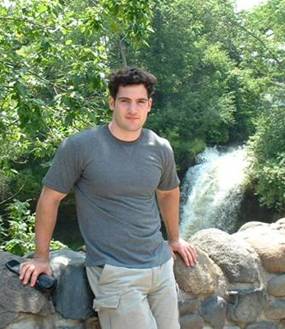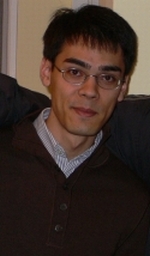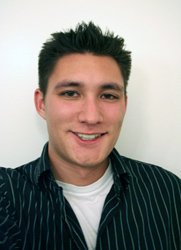- Home
- |
- Modeling
- |
- Impact Equations
- |
- Stability
- |
- Simulation
- |
- Papers
- |
- About Us
About the contributors
Our mission is to understand humanoid locomotion by applying geometric reduction to control strategies for robotic immitation.
|
List of Contributors Faculty Advisor: Shankar Sastry Graduate Student: Aaron Ames Undergraduate: Robert Gregg Undergraduate: Eric Wendel Undergraduate: Jonathan Tesch Graduate Student: Haiyang Zheng | |

|
Aaron D. Ames E-mail: adames AT eecs DOT berkeley DOT edu Aaron D. Ames received his Ph.D. at the University of California at Berkeley in the Department of Electrical Engineering and Computer Sciences. He will be moving to Caltech for a postdoc. under the guidence of John Doyle. His advisor was Shankar Sastry. His mathematics advisor was Mariusz Wodzicki. He also worked with (and receive guidance from) Alberto Sangiovanni-Vincentelli, and Ruzena Bajcsy and Paulo Tabuada. His main area of research is hybrid systems--specifically, developing a mathematical theory of hybrid systems which allows for a better understanding of phenomena unique to hybrid systems, e.g., Zeno. His other areas of interest include dynamical systems, nonlinear control theory, robotics and embedded systems. He received a BS in Mechanical Engineering and a BA in Mathematics from the University of St. Thomas in 2001. |

|
Robert D. Gregg E-mail: bobbyg AT cal DOT berkeley DOT edu Robert D. Gregg received his B.S. in EECS from UC Berkeley in May 2006. He begins his M.S./Ph.D. studies in Fall'06 with the Coordinated Science Laboratory at the University of Illinois at Urbana-Champaign. His research emphasis is the control of hybrid, non-linear, and robotic systems, particularly applied to bipedal robotic walking. His adviser is Mark W. Spong and he participates with the UIUC Locomotion Group. Robert is the recipient of the EECS departmental Arthur M. Hopkin Award and the California Alumni Association Christie Senior Award for Excellence in Creative Innovation. |

|
Eric D.B. Wendel E-mail: ericdbw AT berkeley DOT edu Eric Duong Ba Wendel received his B.S. in Mechanical Engineering from UC Berkeley in May 2006. He specializes in the simulation and control of mechanical systems and was co-author of the recently submitted "Towards the Geometric Reduction of Controlled Three-Dimensional Bipedal Robotic Walkers." He has been an undergraduate researcher at Berkeley since his freshman year, and after graduation will tackle challenging engineering issues in the aerospace industry. After a year in industry he will pursue a Ph.D. in Electrical Engineering, emphasizing in nonlinear control theory as applied to topics in robotics, hybrid and multi-agent systems. |

|
Jonathan Tesch E-mail: jtesch AT berkeley DOT edu Jonathan Tesch received his B.S. in Mechanical Engineering at UC Berkeley in May 2006, with an emphasis on fluids, dynamics, and controls. His current research focuses on passive bipedal walking - specifically, on the use of Poincare sections and the Newton-Raphson algorithm to search for fixed points. In addition, he conducts MEMS and microfluidics research designing a micro-bioreactor to study bacterial biofilm formation. After graduation, he intends to persue an advanced degree at UCLA with research involving biomimetic robotics and autonomous systems. From 2003 to 2005, he was Editor-in-Chief of California Engineer Magazine. |

|
Haiyang Zheng E-mail: hyzheng AT eecs DOT berkeley DOT edu Haiyang Zheng received his PhD at the University of California, Berkeley, in the Department of Electrical Engineering and Computer Sciences, working with Prof. Edward A. Lee. His research interests involve the theory, modeling, and simulation of discrete-event and hybrid systems, and he has been intimately involved in the development and usage of the HyVisual and the Ptolemy II software frameworks. His other interests include synchronous languages and real-time systems. |

|
Shankar Sastry E-mail: sastry AT eecs DOT berkeley DOT edu |